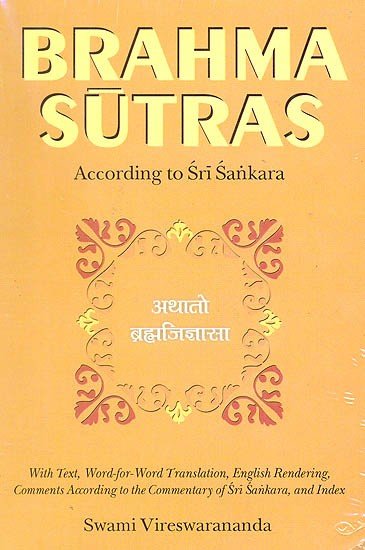Brahma Sutras (Shankara Bhashya)
by Swami Vireshwarananda | 1936 | 124,571 words | ISBN-10: 8175050063
This is the English translation of the Brahma-sutras including the commentary (Bhashya) of Shankara. The Brahma-sutra (or, Vedanta-sutra) is one of the three canonical texts of the Vedanta school of Hindu philosophy and represents an early exposition the Vedantic interpretation of the Upanishads. This edition has the original Sanskrit text, the r...
Chapter II, Section I, Adhikarana I
Adhikarana summary: Refutation of Smritis that are not based on the Srutis
Sutra 2,1.1
स्मृत्यनवकाशदोषप्रसङ्ग इति चेत्, न,
अन्यस्मृत्यनवकाशदोषप्रसङ्गात् ॥ १ ॥
smṛtyanavakāśadoṣaprasaṅga iti cet, na,
anyasmṛtyanavakāśadoṣaprasaṅgāt || 1 ||
smṛti-anavakāśa-doṣaprasaṅgaḥ—There would result the defect of leaving no scope for certain Smritis; iti cet—if it be said; na—no; anyasmṛti-anavakāśa-doṣaprasaṅgāt—because there would result the defect of leaving no scope to some other Smritis.
1. If it be said that (from the doctrine of Brahman being the cause of the world) there would result the defect of leaving no scope for certain Smirits, (we say) no; because (by the rejection of that doctrine) there would result the defect of leaving no scope for some other Smritis.
In the last chapter it has been shown that the Sankhyan view is not based on scriptural authority. Now its authority even as a Smriti is denied and refuted.
If the doctrine of the Pradhana is rejected, then the Sankhya Smriti, propounded by a great seer like Kapila and acknowledged by other great thinkers, would ccase to be authoritative : hence it is but reasonable that the Vedanta texts be so interpreted as to preserve the authorilativeness of this Smriti and not contradict it in toto , So says the opponent. The Sutra answers this by saying that if the docti'ine of Brahman being the cause of the world be rejected to accommodate the Sankhya Smriti, which goes counter to the Srutis, then by that rejection many other Smritis like the Manu Smriti, which are based on the Srutis and therefore more authoritative, and, which also propound the doctrine of Brahman, an intelligent principle, being the cause of the world, would find no scope. So between the two it is desirable that the Smritis which go counter to the Vedas be rejected.
Brahma-Sutra 2.1.2: Sanskrit text and English translation.
इतरेषां चानुपलब्धेः ॥ २ ॥
itareṣāṃ cānupalabdheḥ || 2 ||
itareṣāṃ—Of the others; ca—and; anupalabdheḥ—there being no mention.
2. And there being no mention (in the scriptures) of the other entities, (i.e. the categories beside the Pradhana), (the Sankhya system cannot be authoritative).
Even accepting the Pradhana of the Sankhyas for argument’s sake—for the Vedantins also recognize Maya as the cause of the world, the difference between the two being that the Pradhana according to the Sankhyas is an independent entity, whereas Maya is a dependent entity, being a power of Brahman— yet there is no mention of the other categories of the Sankhyas anywhere in the Vedas. Hence the Sankhya philosophy cannot be authoritative.
